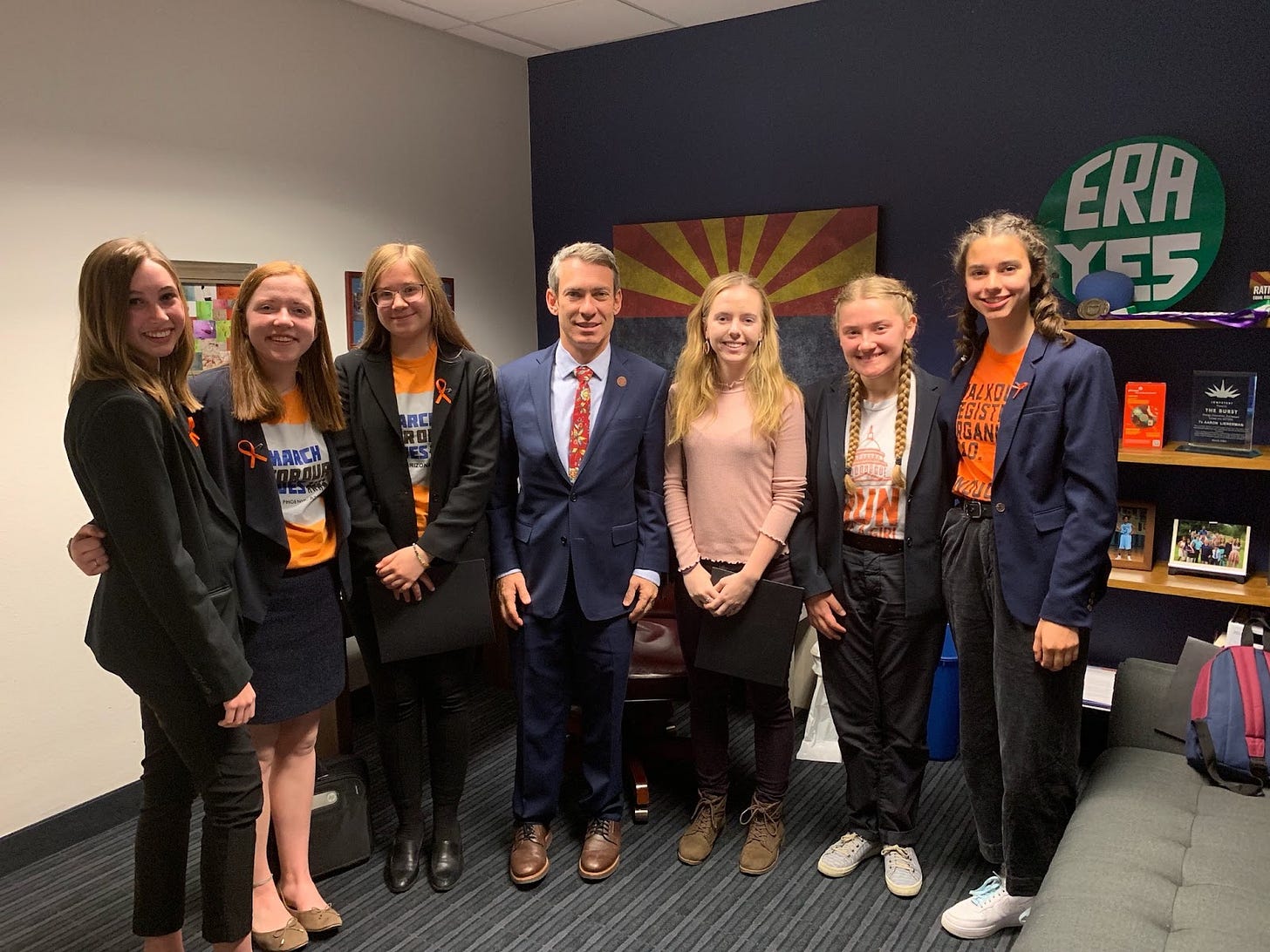Politicians seem far away. You read about them in the news and see them on your social media feed, but they can seem removed—almost of a different world.
However, our elected officials need us just as much as we need them. We need them in order to have everything from water to functioning traffic lights, fair and free elections to approving that patio renovation you want. And they need us—their constituents—because without us, they lose both their connection to the issues that they oversee and their voter base.
So, politicians need us and we need them. How do we tell them what we want them to do?
The answer is, well, complicated.
Sara: A Proposal and a Cup Full of Quarters
I brought probably 30 quarters to my first downtown meeting.
I was meeting with the Maricopa County Recorder’s Office that day and my mom (a veteran downtown driver) had told me that there would be metered parking, so I loaded up my cup holder with every quarter that I owned. If you can’t tell, I was a bit nervous.
Full of ideas as I entered the building, I had drafted a complete proposal for a Maricopa County Junior Deputy Registrar program. I didn’t expect much to come out of it, but I was ready to try.

When I sent my proposal to the County Recorder’s Office, though, they responded—they wanted to meet with me. I hadn’t expected my elected officials to be so easy to reach. Walking from my parking meter, I didn’t know how to feel beyond being nervous.
The person I was meeting greeted me in the lobby with a warm handshake and introduction. She made every effort to put me at ease, even introducing me to both the County Recorder himself and interns close to my age at the office.
I didn’t expect a proposal for youth involvement in the voter registration space to be taken seriously. The County Recorder’s Office, though, was excited by my ideas—they had been looking for ways to involve more young people for quite a while. My proposal is now a part of a brand-new Junior Deputy Registrar program.
My first personal experience with an elected official is certainly not typical; most proposals generate a more complex reaction. In many cases, I know that constituents’ ideas are overlooked, ignored, or rejected (whether due to political motivations or simply a lack of feasibility). Nevertheless, as I walked away from the County Recorder’s Office nervous that I hadn’t put enough quarters into my meter, I had one vital takeaway: voicing your opinions isn’t effortless, and those in power don’t always listen, but you don’t need connections, status, or even a diploma to do it.
Isabel: A Tale of Two Meetings
In high school I LOVED a good excuse to call in sick from class. So, when my activism allowed me to switch pretending I understood logarithms for pretending I understood lobbying, I was absolutely game. About a year into my work with March For Our Lives, I joined with other organizers to draft and submit our first bill to the state legislature. With the help of other gun-sense organizations and legislators, we planned and executed the first annual MFOL “lobby day,” where students had the opportunity to meet with their lawmakers and advocate for legislation they believed in.
My first meeting, luckily, took me to the offices of my very own representatives, Kelli Butler (D-28), and Aaron Lieberman (D-28). Before our group of faux-lobbyists could even take our seats, we were greeted with hugs and chit-chat. After giving our personal testimonies, explaining the language of the bill, and answering questions, we had two pledges of support.
But it soon came time to face the dragons: Arizona’s “moderate” Republican representatives. Knowing that almost all of the conservative caucus received high ratings and endorsements from the National Rifle Association, we strategized how to frame our bill’s contents to take it as far away from guns as possible.
I was seated across from a senator who was both revered and loathed for her willingness to cross the aisle on certain issues. Based on my research, however, gun control was not one of them. Given my anxiety about meeting with a lawmaker who probably would not agree with us, I was pleasantly surprised by how warm and inviting she acted. This kindness, unfortunately, did not extend to interest in our legislation. After we briefly explained our mission, the senator changed the subject to another bill she was working on, which would limit the sale of e-cigarette and vape products. She excitedly told us how glad she was to finally receive youth input! An actual lobbyist might have redirected the conversation back to the bill, but no matter how hard we tried to dress like it, we were not actual lobbyists. Fifteen minutes of discussion on vapes later, the senator had to end the meeting without disclosing whether she would support our bill.
I knew that it was an important feat that students advocating for a highly controversial issue were able to take space in lawmakers’ schedules. However, I wondered how impactful our work really was if we could not take any space in their minds? Had every lawmaker made up their mind on our issue before we even entered the doorway? Speaking to young constituents gives elected officials a sense of what it feels like to have us at the table. Actually listening to them gives us a seat—and respect.







